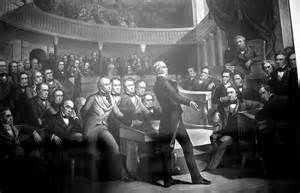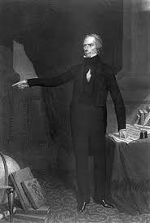Henry Clay: American Statesman
Part 2: Political Legacy In 1820, he secured his first large achievement on the national stage: the Missouri Compromise. More and more people in more and more territories were seeking admittance to the Union, and Congress was eager to keep the precarious balance between "free" states and "slave" states. At Clay's insistence, Congress approved the admission of Missouri as a slave state and Maine as a free state and also drew a geographical line across the country, to serve as a boundary between "free" and "slave" territory. 
Clay, a slave owner himself at first, was a believer in the gradual emancipation of slaves but only if they left for Africa. As the 19th Century progressed, this idea became popular with a growing number of (white) people throughout the country. Clay as president of the American Colonization Society, whose goal was to transport African-Americans to West Africa, for several years. Clay ran for President in 1824 but did not win. No one else did, initially. No candidate had achieved the necessary number of votes in the Electoral College, and so the election of the president had gone to the House of Representatives. Andrew Jackson had received the most electoral votes, and John Quincy Adams had received the second-most. Clay, whose total was the fourth-most (with Secretary of Treasury William Crawford third), agreed to ask his supporters to vote for Adams instead, and the resulting total was enough for Adams to claim the needed total and be elected President. In return, Adams named Clay Secretary of State. A disappointed Jackson and others labeled the actions a "corrupt bargain." As Secretary of State, Clay pushed the agenda of the American System, a plan for emphasizing economic development through federal funding, a protective tariff, and a reduction in dependence on imports. The American System called for a major investment in roads, bridges, and canals, and Clay was a strong proponent of the National Road. Clay was one of the leaders of the National Republican Party, which became the Whig Party. He also achieved the ratification of several commercial treaties and developed economic ties with some of the countries declaring themselves from Spain. Kentucky voters sent Clay back to Washington, D.C., in 1830, this time to the U.S. Senate. He served in that body from 1831 to 1842 and from 1849 to 1852. Clay clashed with President Andrew Jackson over the renewal of the charter of the Bank of the United States, which Clay had supported since its inception and thought vital to the advancement of the American System. When Jackson vetoed the bill for recharter of the Bank, Clay led the drive to officially censure Jackson. The censure didn't dent Jackson's popularity. Clay also clashed with Jackson over the President's policies regarding Native Americans. Clay strongly resisted the Indian Removal Act of 1830 and insisted that the Five Civilized Tribes and others had a right to the lands on which they were living. Still a very popular personality in 1840, Clay expected to be nominated by the Whig Party as its presidential candidate, to oppose Martin van Buren, who was running for re-election in the midst of economic uncertainty. Instead, the Whigs chose war hero William Henry Harrison, who , was elected. Clay did finally achieve the Whig Party presidential nomination in 1844 but lost that election to James K. Polk. He tried one more time four years later, but the Whigs chose another war hero, Zachary Taylor, who won the election. 
He claimed two more important achievements in the realm of compromise, one in 1833 and one in 1850. His Compromise Tariff of 1833 eased tensions between President Andrew Jackson and the State of South Carolina, in what has been called the Nullification Crisis. His Compromise of 1850 attempted to solved a number of problems regarding the spread of slavery into new territories and the ability of slave owners to control what happened runaway slaves. Clay himself fell ill during final debate on that series of bills, and his ally Stephen A. Douglas finished things off. Clay had contracted tuberculosis, which eventually killed him. He died on June 29, 1852. He was the first person ever to lie in state in the U.S. Capitol rotunda. Later, he was buried in Lexington, Ky. Another of Clay's monikers was the "Great Pacificator." A powerful speaker, he uttered a few famous quotes:
First page > Early Days > Page 1, 2 |
|
Social Studies for Kids
copyright 2002–2026
David White




